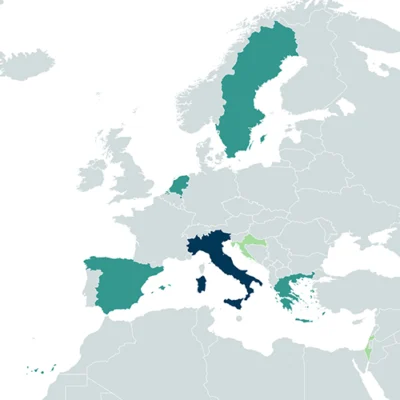
Coordinated and Adaptive Monitoring of Biodiversity change across Mediterranean rocky ecosystems
Call
Duration
01/03/2024 – 28/02/2027
Total grant
Approx. 1,1 mil. €
More information
Sylvaine GIAKOUMI
sylvaine.giakoumi@szn.it
Partners of the project
- Sicily Marine Centre, Zoological Station Anton Dohrn, Palermo, Italy
- Department of Marine Sciences, University of the Aegean, Mytilene Greece
- Department of Social Anthropology, Stockholm University, Stockholm, Sweden
- Department of Marine Ecology, The Spanish National Research Council, Blanes, Spain
- Department of Biology, University of Pisa, Pisa, Italy
- Department of Intelligent Systems, Delft University of Technology, Delft, Netherlands
- Future Oceans Lab, University of Vigo, Vigo, Spain
- Self-financed partner A: Department of Marine Biology, Oceanographic and Limnological Research, Haifa, Israel
- Self-financed partner B: Centre for Marine Research, Ruder Boskovic Institute, Rovinj, Croatia

Context
Rocky reefs are a hotspot of Mediterranean marine biodiversity. At the same time, these ecosystems are highly impacted by multiple human activities and global change. The Mediterranean Sea has already suffered from rapidly increasing overexploitation and mass mortalities due to heatwaves. Such biodiversity shifts have affected ecosystem functioning and compromised conservation efforts. Long-term data are essential for evaluating ecosystem responses to disturbances (including global changes), providing baselines to evaluate change, and assessing the effectiveness of management measures in securing ecosystem structure, function, and services provision. In CAMBioMed, we will develop an adaptive monitoring framework together with stakeholders, propose a novel toolkit for efficiently monitoring Mediterranean rocky ecosystems, and enable decision-makers to answer critical questions about the conservation of changing marine rocky ecosystems.
Main objectives
CAMBioMed aims to:
- harmonise and improve monitoring designs, capitalising on the partners’ long experience in national monitoring programs and the use of innovative tools (e.g. eDNA metabarcoding, satellite remote sensing, and artificial intelligence) for monitoring rocky reefs across the Mediterranean Sea;
- improve our knowledge on the response of Mediterranean marine ecosystems to global and local stressors, by conducting extensive fieldwork and integrating an unprecedented volume of historical and new data;
- provide a roadmap and practical guidelines for adaptive monitoring that incorporates social perceptions and values to contribute to the effective conservation of rocky reef ecosystems in the Mediterranean Sea, with a view to help and fulfil the objectives of the Biodiversity Strategy for 2030 and secure human wellbeing.
Main activities
CAMBioMed is a transdisciplinary project combining natural sciences (marine biology & ecology), technological sciences (computer sciences & engineering), and social sciences (social anthropology & environmental economics). The main activities are to develop an adaptive monitoring framework for Mediterranean rocky reefs and track large-scale and long-term ecosystem changes along environmental gradients; support upscaling of monitoring using innovative tools, such as drones, computer vision, and e-DNA metabarcoding; and promote the monitoring of biodiversity and ecosystem changes with citizen science and anthropological assessment of social, economic, and cultural contexts. CAMBioMed will co-develop the research activities by consulting stakeholders at different levels, from high-level policy stakeholders (e.g. national ministries) to case study stakeholders (e.g. local fishers) and the general population by means of interviews, focus groups and/or workshops. This engagement is built upon ongoing stakeholder interactions with partners in existing projects and citizen science initiatives that will be upscaled by CAMBioMed to design and develop the adaptive, relevant and useful monitoring framework. CAMBioMed will provide a more comprehensive assessment of ecosystem health, allowing for the monitoring program to evolve in response to changing conditions, and for decision-makers to answer critical questions related to biodiversity conservation in a changing Mediterranean Sea.



